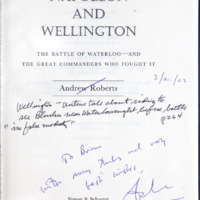-
Title
-
Napoleon and Wellington : the Battle of Waterloo and the great commanders who fought it
-
Description
-
Explores the relationship between the French emperor Napoleon Bonaparte and the Duke of Wellington prior to and in the aftermath of the Battle of Waterloo, the most decisive battle of the nineteenth century.
-
Identifier
-
1054960
-
743228324
-
Creator
-
Roberts, Andrew
-
Source
-
Brian Lamb Booknotes Collection
-
Gift of Brian Lamb, 2011.
-
Catalog record
-
Language
-
eng
-
Date
-
2001
-
Program air date: January 12, 2003
-
Publisher
-
Simon & Schuster
-
George Mason University. Libraries. Special Collections & Archives
-
Text
-
Transcription of Annotations
Notes on front and back endpapers illustrate the relationship between Napoleon and Wellington and provide some biographical information on each of them. Napoleon called Wellington a sepoy general. Wellington, a high Tory and a supporter of Bourbon, admired Napoleon as a soldier but despised him otherwise, although he saved his life after the battle of Waterloo by refusing to hand him over to the Prussians to be executed. Napoleon, on the other hand believed that Wellington was instrumental in having him exiled to St. Helena. According to the notes Napoleon and Wellington had affairs with the same two mistresses. The notes also refer to Napoleon's Russian campaign during which he lost 370,000 of 650,000 troops; in addition, 200,000 soldiers were captured. In comparison, Wellington never commanded more than 75,000 troops. He was angered by Napoleon's lack of concern for the welfare of his troops. A note refers to Napoleon's dream of one Europe, which has come true. -- Annotations by Brian Lamb in the margins and underlining of pertinent phrases throughout the book. - Examples: p. [xxxiii]: "Myths: Napoleon's over-confidence; Wellington's modesty and near perfect gentlemanliness; they never met nor corresponded, fought only one battle; Napoleon's disdain for Wellington, Wellington's respect for Napoleon: entirely wrong; Napoleon loathed Wellington, Wellington despised Napoleon; 1804: Emperor of France; 1808: Napoleon Master of Europe; Napoleon won 60 of 70 battles; Wellington - far fewer - won them all; Waterloo [was] their last." -- p. 109: "There can be no doubt that Wellington studied Napoleon's strategy in a way that Napoleon omitted to do with Wellington." - p. 119: "It cannot be overemphasized that the Napoleonic Wars were not won by the British army: It was not the Spanish ulcer, but the Russian coronary which destroyed Napoleon." - p. 265: "Wellington was an essentially eighteenth century figure who relished his own achievements, tended to talk them up, and did not indulge in false modesty; it was only the Victorians who tried to turn him in his old age into a paragon of self-effacement." - p. 297: "In Napoleon, a man of superior intellect, undoubted military genius, great depths of knowledge, genuine artistic tastes and fine wit, History provides the ultimate proof that dictatorships cannot remain benevolent and absolute power does indeed corrupt absolutely."
-
Subject
-
"Wellington, Arthur Wellesley, Duke of, 1769-1852--Military leadership."
-
"Napoleon I, Emperor of the French, 1769-1821--Military leadership."
-
Relation
-
Original Booknotes interview
-
Rights
-
This work may be protected by copyright laws and is provided for educational and research purposes only. Any infringing use may be subject to disciplinary action and/or civil or criminal liability as provided by law. If you believe that you are the rights-holder and object to Mason’s use of this image, please contact speccoll@gmu.edu.
 1054960.pdf
1054960.pdf